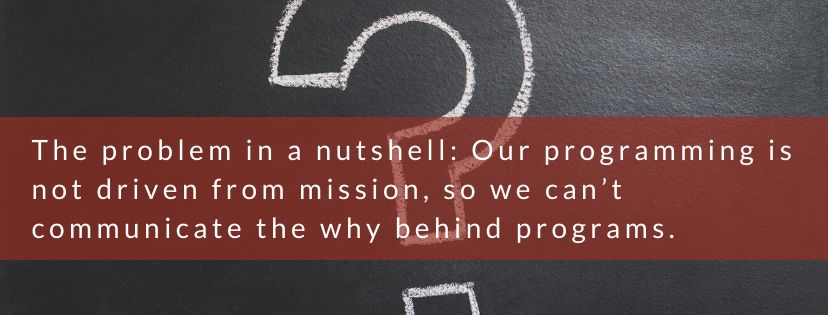Why Youth Ministries get Stuck
Youth ministries are shrinking, and students are disengaged. And your job responsibilities just keep growing. You’re probably tired of being overwhelmed.
I have coached about 30 youth pastors in the past two years, and all of them come to me for the same reason. There is no growth in the youth ministry. Student attendance is falling off, they can’t recruit volunteers, and parents have higher priorities than youth group.
Does this sound familiar?
Youth ministries are doing the same programming they were doing three years ago, but students don’t seem to respond the same way or adult volunteers are busier than ever and don’t have the time to meet with students more than one time each week. Parents just seem to want other things for their students.
What I have learned is that youth ministries lose traction not because of programming, teaching, or summer activities but more because of alignment, communication, and adult volunteer training.

The problem in a nutshell: Our programming is not driven from mission, so we can’t communicate the why behind programs. When we don’t know the why behind programs, we don’t train our adult volunteers on what they should be doing at events. So, they lose interest, students don’t feel cared for, and parents don’t know why youth group is important.
Stuck.
This is often not very hard to fix, but it does require intentionality and change. Here are some ways to regain momentum in your youth ministry.
How to regain momentum in your ministry
Overemphasize mission
Return to purpose. Make sure that every programming element can be tied back to the mission of the youth ministry. If you have a mission statement that you got from someone else, pitch it. This may be a good time to rework your mission to what God has called you to do.
If you don’t know how to do this, call me and I will spend a few minutes walking you through this. We will match your burden with values and vision to help you clarify your calling.
Underemphasize games and overemphasize relationships
Games are great when the goal of games is deeper relationships between students and volunteers. Oftentimes the goal of games is how cool we can make them, but that goal doesn’t produce anything that lasts. So, students just want cooler and cooler games and when you can’t deliver, they move on. But if we were intentional about games, then relationships formed in games will move from memories to laughter to discussion to life-changing moments of discipleship.
As a youth pastor, I would create games that made heroes of my small group leaders. On purpose I would make games out of Jackson 5 songs because that was one thing a small group leader really loved. He helped his students win the game and became an instant hero!
If games are about making you and your youth ministry cool, you will remain stuck.
Underemphasize biblical literacy and overemphasize discipleship
Knowing Bible stories is important but living out the truth of God’s Word in our thoughts and actions is essential. We must move past telling stories to engaging students in a relationship with their King.
If your students love to sing but can’t pray, this is a good indication that you have focused on spiritual behavior over a personal relationship with Christ.

Overemphasize parents’ needs
Stop asking parents to get on board with your program and instead find out what their needs are and meet them.
I recently challenged a youth pastor to do this. He asked parents through a Facebook page what their needs were, and he discovered that a family in their church needed food. He stopped everything and rallied other families to help. Because of this experience other parents started sharing their needs, and the whole church got involved helping each other out. In his words, “parents started seeing the youth ministry as vital.”
If you want parents to care about the youth ministry, care for them first. When you make parents a priority, they will make youth ministry a priority.
Underemphasize your teaching
Students can listen for about 7 minutes before they start to tune you out. Speak for a total of 20 minutes, have an activity after the first 7, and make just one point. Every youth worker I know that uses this strategy sees more student engagement and deeper learning.
Overemphasize adult volunteer comradery
Every great youth ministry has one thing in common: adult volunteers love, love, love to be at youth group with each other. When there is chemistry between volunteers, they support each other, challenge each other, and have tons of fun together.
Don’t overlook this point. The youth staff that has fun together wins together. This is maybe the most underrated strategy in youth ministry.
Underemphasize numbers
“Numbers” are every youth ministry’s secret target because we don’t know how to explain transformation. Don’t make your “numbers” about total attendance—that will cause you to make bad decisions about what is important.
There are ways to use “numbers,” like we want to have 25 students make commitments of faith this year or we want 30 new students in discipleship small groups. Announce your “numbers” to your team and keep track of progress. Numbers can work for you—you just need to make sure they are the right “numbers” you’re chasing.
Having a stuck youth ministry is a choice. You can choose to be stuck and stay stuck by doing the same things year after year or you can make intentional changes to get your ministry unstuck and start growing in the right direction. It’s really all about your actions.
At LeaderTreks we have a coaching program called Youth Ministry Reset. This program will help you get unstuck and begin growing in the right direction. If you’re interested, check it out on our website. We would love to help you.
About the Author
Doug Franklin
Doug Franklin is the president of LeaderTreks, an innovative leadership development organization focusing on students and youth workers. Doug and his wife, Angie, live in West Chicago, Illinois. They don’t have any kids, but they have 2 dogs that think they are children. Diesel and Penelope are Weimaraners who never leave their side. Doug grew up in… Read More




